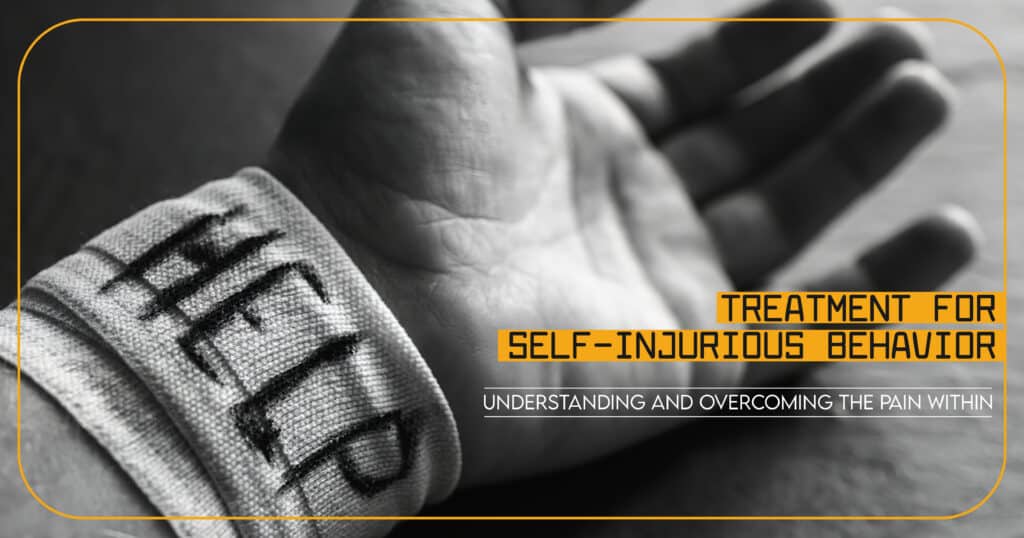
Self-injurious behavior, also known as self-harm, is a complex issue that affects individuals from all walks of life. It is a manifestation of inner pain and emotional distress, often serving as a coping mechanism for overwhelming emotions or a way to regain control over one’s body. While the act of self-injury may provide temporary relief, it is important to recognize that it is not a healthy or sustainable solution. In this article, we will explore the treatment options available for individuals struggling with self-injurious behavior, providing insights, strategies, and support to help them overcome the pain within.
Understanding Self-Injurious Behavior
Before delving into treatment options, let us first understand what self-injurious behavior entails. Self-harm refers to deliberate actions that cause physical harm to oneself, such as cutting, burning, scratching, or hitting. It is important to note that self-injury is not a suicide attempt but rather a way to cope with overwhelming emotions or to feel a sense of control. Some commonly observed reasons for self-injurious behavior include:
- Emotional regulation: Individuals may use self-harm as a way to regulate their emotions, finding temporary relief from emotional pain or numbness.
- Communication: Some individuals struggle to express their emotional pain verbally, and self-injury may serve as a means of communication or cry for help.
- Coping mechanism: Self-injury can become a maladaptive coping mechanism for dealing with stress, trauma, or other overwhelming experiences.
- Self-punishment: Feelings of guilt, shame, or self-hatred may lead individuals to engage in self-injurious behavior as a form of self-punishment.
The Importance of Professional Help
When faced with self-injurious behavior, it is crucial to seek professional help. While self-harm may be a deeply personal and private act, it is not a problem that can be resolved without the support and guidance of trained professionals. Therapists, counselors, and psychologists specializing in self-harm treatment can provide the necessary tools, insights, and therapies to address the underlying issues contributing to self-injurious behavior.
Treatment Options for Self-Injurious Behavior
Therapy:
- Cognitive Behavioral Therapy (CBT): CBT helps individuals identify and challenge negative thoughts and behaviors, replacing them with healthier coping mechanisms.
- Dialectical Behavior Therapy (DBT): DBT focuses on developing mindfulness, emotional regulation, distress tolerance, and interpersonal effectiveness skills. It can be particularly effective in treating self-injurious behavior.
- Psychodynamic Therapy: This type of therapy helps individuals explore the underlying causes and unconscious motivations behind self-injury, facilitating healing and personal growth.
Medication:
- Antidepressants: In some cases, antidepressant medications may be prescribed to help regulate mood and reduce the frequency and intensity of self-injurious behavior.
- Anti-anxiety medications: For individuals experiencing anxiety disorders that contribute to self-harm, medications such as benzodiazepines may be prescribed under the supervision of a psychiatrist.
Support Groups:
- Peer support groups or group therapy sessions can provide individuals struggling with self-injurious behavior a safe space to share their experiences, receive validation, and learn from others who have gone through similar struggles.
Alternative Therapies:
- Art therapy: Engaging in creative endeavors can help individuals express and process their emotions in a non-verbal manner, serving as a therapeutic outlet.
- Mindfulness practices: Techniques such as meditation, deep breathing, and grounding exercises can help individuals develop awareness of their emotions and reduce impulsive behaviors.
FAQs about Treatment for Self-Injurious Behavior
Q: Can self-injurious behavior be treated successfully?
Yes, with the right support and treatment plan, individuals can overcome self-injurious behavior and find healthier coping mechanisms.
Q: Is medication necessary for treating self-harm?
Medication may be helpful for some individuals, but it is not the sole treatment for self-injurious behavior. Therapy and other interventions play an important role in addressing the underlying causes.
Q: How long does it take to recover from self-injurious behavior?
Recovery timelines vary for each individual. It is a journey that requires time, effort, and dedication. Healing is a process that unfolds at its own pace.
Q: Is self-injurious behavior a sign of weakness?
Absolutely not. Self-injurious behavior is a sign of inner pain and emotional distress. It takes courage and strength to seek help and work toward healing.
Reclaiming a Life of Empowerment
In summary, treatment options for self-injurious behavior encompass therapy, medication, support groups, and alternative therapies. Seeking professional help is essential and can provide the necessary guidance and support to address the underlying causes of self-harm. Remember, recovery is possible, and every step taken toward healing is a testament to one’s strength and resilience.
If you or someone you know is struggling with self-injurious behavior, reach out to mental health professionals who can provide the care and support needed to embark on a journey of healing and empowerment. Revival Mental Health is a premier resource and intensive mental health treatment center serving men and women in Orange County, CA. Our clients receive personalized care twenty-four hours a day, overseen by our psychiatry team and doctorate- or master-level clinicians. We maintain several clients in our homes to provide an intimate treatment environment. This allows us to address various clinical concerns while providing a very individualized treatment experience.




